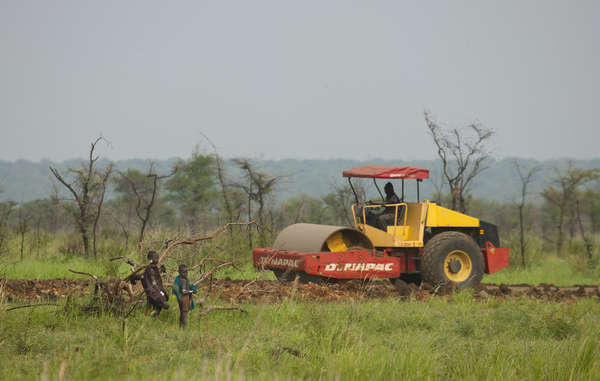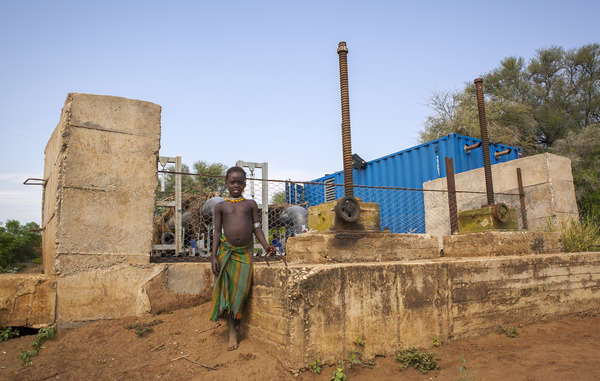Wednesday, August 6, 2014
Saturday, June 28, 2014
Wednesday, June 25, 2014
Aid donors announce investigation into tribal evictions in Ethiopia | Ekklesia
Representatives of some of Ethiopia’s biggest aid donors have announced that they will send a team to the southwest of the country to investigate persistent reports of human rights abuses amongst the tribes living there.
Survival International, the global movement for tribal peoples’ rights, has exposed how the tribal people of the Lower Omo Valley are being persecuted and harassed to force them off their land to make way for cotton, oil palm and sugar cane plantations and many other organisations have published similar reports.
The plantations are made possible by the Gibe III hydroelectric dam, which is itself the subject of huge controversy. The dam, which is nearing completion, will have a serious impact on the livelihoods of 500,000 tribal people, including those living around Kenya’s Lake Turkana. It is also projected to have catastrophic environmental consequences for the region, which is home to renowned UNESCO World Heritage sites on both sides of the border.
Survival and other NGOs have repeatedly denounced the eviction of hundreds of Bodi and Kwegu and continue to receive reports that people are being intimidated into leaving their lands for resettlement camps.
The Ethiopian government has not sought or obtained the indigenous peoples’ free, prior and informed consent to move from their lands, in breach of the guidelines for resettlement drawn up by the Development Assistance Group (DAG), a consortium of the largest donors to Ethiopia, including the US, the UK, Germany and the World Bank. DAG provides significant financial assistance to the local administration responsible for the forced evictions.
DAG has decided to return to the Lower Omo later this year to investigate the situation, even though the evictions continue regardless of past donor visits, the findings of which have often not been published.
This decision follows mounting worldwide concerns. European parliamentarians from Italy, Germany and the UK have asked questions in the European Parliament, and MPs in the UK and Germany have raised their concerns with various ministries. Parliamentary questions have also been tabled in the UK.
In February the US Congress ruled that US taxpayers’ money not be used to fund forced resettlements in Lower Omo.
Following a lawsuit brought by Friends of Lake Turkana, the Kenyan courts have ruled that the Kenyan government must release all information about the deals it has made with Ethiopia about buying electricity generated by the Gibe III dam.
Earlier this year, a UNESCO report recommended that Lake Turkana be inscribed on the List of World Heritage in Danger.
Monday, June 23, 2014
Aid donors announce investigation into tribal evictions in Ethiopia - Survival International

Bulldozers clearing Mursi land in Mago National Park, where communities are being evicted from their land to make way for sugar plantations.
© E. Lafforgue/Survival
Representatives of some of Ethiopia’s biggest aid donors have announced that they will send a team to the southwest of the country to investigate persistent reports of human rights abuses amongst the tribes living there.
Survival International, the global movement for tribal peoples’ rights, has exposed how the tribal people of the Lower Omo Valley are being persecuted and harassed to force them off their land to make way for cotton, oil palm and sugar cane plantations.
Many other organizations have published similar reports.
The plantations are made possible by the Gibe III hydroelectric dam, which is itself the subject of huge controversy.
The dam, which is nearing completion, will have a serious impact on the livelihoods of 500,000 tribal people, including those living around Kenya’s Lake Turkana.
It is also projected to have catastrophic environmental consequences for the region, which is home to renowned UNESCO World Heritage sites on both sides of the border.
Survival and other NGOs have repeatedly denounced the eviction of hundreds of Bodi and Kwegu and continue to receive reports that people are being intimidated into leaving their lands for resettlement camps.

Daasanach are being forced off their land to make way for infrastructure development such as this giant pump at Omorate, which will facilitate irrigation of the plantations.
© E. Lafforgue/Survival
The Ethiopian government has not sought or obtained the indigenous peoples’ free, prior and informed consent to move from their lands, in breach of the guidelines for resettlement drawn up by the Development Assistance Group (DAG), a consortium of the largest donors to Ethiopia, including the US, the UK, Germany and the World Bank.
DAG provides significant financial assistance to the local administration responsible for the forced evictions.
DAG has decided to return to the Lower Omo later this year to investigate the situation, even though the evictions continue regardless of past donor visits, the findings of which have often not been published.
This decision follows mounting worldwide concerns. European parliamentarians from Italy , Germany and the UK have asked questions in the European Parliament, and MPs in the UK and Germany have raised their concerns with various ministries. Parliamentary questions have also been tabled in the UK.
In February the US Congress ruled that US taxpayers’ money not be used to fund forced resettlements in Lower Omo.
Following a lawsuit brought by Friends of Lake Turkana, the Kenyan courts have ruled that the Kenyan government must release all information about the deals it has made with Ethiopia about buying electricity generated by the Gibe III dam.
Earlier this year, a UNESCO report recommended that Lake Turkana be inscribed on the List of World Heritage in Danger.
Friday, April 11, 2014
Thursday, February 6, 2014
- Ethiopia Land for Sale -- Aljazeera
-----------
As the economy thrives, we examine the plight of Ethiopians forced from their land to make way for foreign investors.People and Power Last updated: 30 Jan 2014 07:52 | ||
| Just a few decades ago, Ethiopia was a country defined by its famines, particularly between 1983-1985 when in excess of half a million people starved to death as a consequence of drought, crop failure and a brutal civil war. Against this backdrop, it is impressive that in recent years, Ethiopia has been experiencing stellar economic growth. The headline statistics are certainly remarkable: the country is creating millionaires faster than any other in Africa; output from farming, Ethiopia’s dominant industry, has tripled in a decade; the capital Addis Ababa is experiencing a massive construction boom; and the last six years have seen the nation’s GDP grow by a staggering 108 percent. But it is not all positive news, because for all the good figures there are still plenty of bad ones. Around 90 percent of the population of 87 million still suffers from numerous deprivations, ranging from insufficient access to education to inadequate health care; average incomes are still well below $1500 a year; and more than 30 million people still face chronic food shortages. And while there are a number of positive and genuine reasons for the growth spurt - business and legislative reforms, more professional governance, the achievements of a thriving service sector - many critics say that the growth seen in agriculture, which accounts for almost half of Ethiopia’s economic activity and a great deal of its recent success, is actually being driven by an out of control ‘land grab', as multinational companies and private speculators vie to lease millions of acres of the country’s most fertile territory from the government at bargain basement prices. At the ministry of agriculture in Addis Ababa, this land-lease programme is often described as a "win-win" because it brings in new technologies and employment and, supposedly, makes it easier to improve health care, education and other services in rural areas. "Ethiopia needs to develop to fight poverty, increase food supplies and improve livelihoods and is doing so in a sustainable way," said one official. But according to a host of NGO’s and policy advocates, including Oxfam, Human Rights Watch and the Oakland Institute, the true consequences of the land grabs are almost all negative. They say that in order to make such huge areas available for foreign investors to grow foodstuffs and bio-fuels for export - and in direct contravention of Ethiopia’s obligations under international law - the authorities are displacing hundreds of thousands of indigenous peoples, abusing their human rights, destroying their traditions, trashing the environment, and making them more dependent on food aid than ever before. "The benefits for the local populations are very little," said renowned Ethiopian sociologist Dessalegn Rahmato. "They’ve taken away their land. They’ve taken away their natural resource, because these investors are clearing the land, destroying the forest, cutting down the trees. The government claims that one of the aims of this investment was to enable local areas to benefit by investing in infrastructure, social services … but these benefits are not included in the contract. It's only left up to the magnanimity of the investor." And those investors, he continued, are simply not interested in anything other than serving their own needs: "They can grow any crop they want, when they want it, they can sell in any market they want, whether it’s a global market or a local market. In fact most of them are not interested in the local markets.” He cited as an example a massive Saudi-owned plantation in the fertile Gambella region of south west Ethiopia, a prime target area for investors: "They have 10,000 hectares and they are producing rice. This rice is going to be exported to the Middle East, to Saudi Arabia and other places. The local people in that area don’t eat rice." But the most controversial element of the government’s programme is known as 'villagisation' - the displacement of people from land they have occupied for generations and their subsequent resettlement in artificial communities. In Gambella, where two ethnic groups, the Anuaks and the Nuers, predominate, it has meant tens of thousands of people have been forced to abandon a traditional way of life. One such is Moot, an Anuak farmer who now lives in a government village far from his home. "When investors showed up, we were told to pack up our things and to go to the village. If we had decided not to go, they would have destroyed our crops, our houses and our belongings. We couldn't even claim compensation because the government decided that those lands belonged to the investors. We were scared … if you get upset and say that someone stole your land, you are put in prison. If you complain about being arrested, they will kill you. It's not our land anymore; we have been deprived of our rights." Despite growing internal opposition and international criticism, the Ethiopian government shows no sign of scaling the programme back. According to the Oakland Institute, since 2008, an area the size of France has already been handed over to foreign corporations. Over the next few years an area twice that size is thought to be earmarked for leasing to investors. So what does all this mean for the people on the ground? In Ethiopia – Land for Sale, filmmakers Veronique Mauduy and Romain Pelleray try and find out.
|
Friday, January 31, 2014
US Congress Takes a Historic Stance Against Land Grabs-Related Forced Evictions in Ethiopia
US Congress Takes a Historic Stance Against Land Grabs-Related Forced Evictions in Ethiopia
Monday, January 27, 2014
For Immediate Release January 27, 2014
MEDIA CONTACT:
Anuradha Mittal, 510-469-5228; amittal@oaklandinstitute.org
Frederic Mousseau, 510-512-5458; fmousseau@oaklandinstitute.org
Oakland, CA – In a historic move, the US Congress has taken a stance on land grabs-related human rights abuses in Ethiopia. The 2014 Omnibus Appropriations Bill contains provisions that ensure that US development funds are not used to support forced evictions in Ethiopia.
The bill prevents US assistance from being used to support activities that directly or indirectly involve forced displacement in the Lower Omo and Gambella regions. It further requires US assistance in these areas be used to support local community initiatives aimed at improving livelihoods and be subject to prior consultation with affected populations. The bill goes further and even instructs the directors of international financial institutions to oppose financing for any activities that directly or indirectly involve forced evictions in Ethiopia.
According to Anuradha Mittal, Executive Director of the Oakland Institute, “We welcome this move as it aims to address one major flaw of US assistance to Ethiopia. The step taken by the US Congress is very significant, as it signals to both the Ethiopian government and the US administration that turning a blind eye to human rights abuses in the name of development is no longer an option.”
Several reports from the Oakland Institute have raised alarm about the scale, rate, and negative impacts of large-scale land acquisitions in Ethiopia that would result in the forced displacement of over 1.5 million people. This relocation process through the government’s villagization scheme is destroying the livelihoods of small-scale farmers and pastoralist communities. Ethiopian security forces have beaten, arrested, and intimidated individuals who have refused to relocate and free the lands for large-scale agricultural plantations.
Ethiopia’s so-called development programs cannot be carried out without the support of international donors, primarily the US, one of its main donors. Oakland Institute’s on-the-ground research has documented the high toll paid by local people as well as the role of donor countries such as the US in supporting the Ethiopian policy.
This language represents an important first step towards Congress initiating a comprehensive examination of US development practices in Ethiopia. As the oversight authority of the State Department, Congress must now ensure that the law is fully upheld and implemented. This warrants thorough scrutiny of USAID programs to Ethiopia and their contribution to forced resettlements and human rights abuses.
With this bill, USAID, the State Department, as well as the World Bank, will have to reconsider the terms and modalities of the support they provide to the Ethiopian government. According to Frederic Mousseau, Oakland Institute’s Policy Director, “This is a light of hope for the millions of indigenous people in Ethiopia who have sought international support from the international community to recognize their very destruction as communities and people.”
For more information, see:
Development Aid to Ethiopia: Overlooking Violence, Marginalization, and Political Repression
Ignoring Abuse in Ethiopia: DFID and USAID in the Lower Omo Valley
Omo: Local Tribes Under Threat
Lower Omo: Local Tribes Under Threat (video)
Subscribe to:
Posts (Atom)





